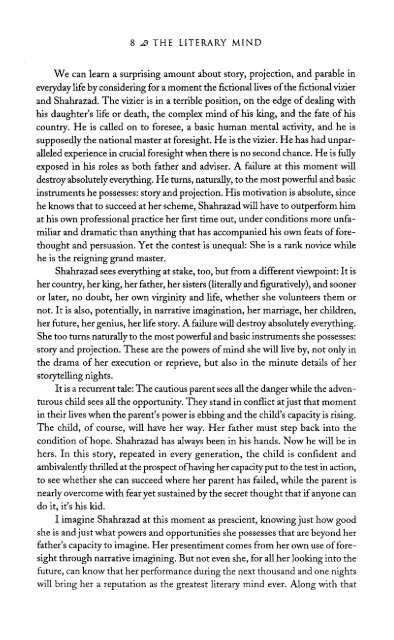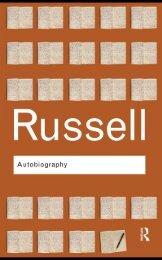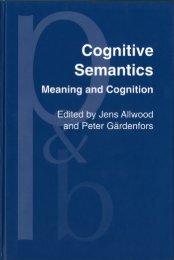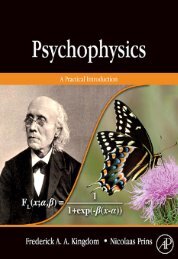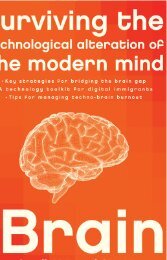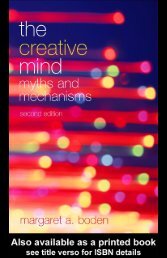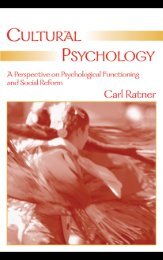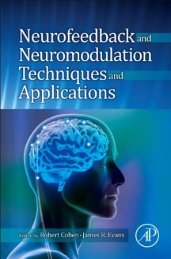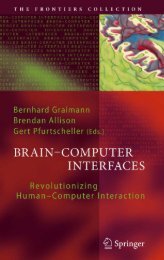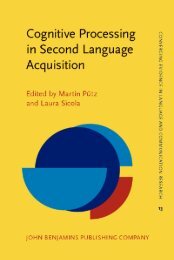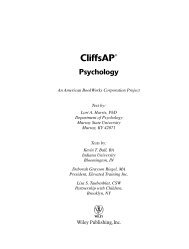The Literary Mind.pdf
The Literary Mind.pdf
The Literary Mind.pdf
You also want an ePaper? Increase the reach of your titles
YUMPU automatically turns print PDFs into web optimized ePapers that Google loves.
8<br />
THE LITERARY MIND<br />
We can learn a surprising amount about story, projection, and parable in<br />
everyday life by considering for a moment the fictional lives of the fictional vizier<br />
and Shahrazad. <strong>The</strong> vizier is in a terrible position, on the edge of dealing with<br />
his daughter's life or death, the complex mind of his king, and the fate of his<br />
country. He is called on to foresee, a basic human mental activity, and he is<br />
supposedly the national master at foresight. He is the vizier. He has had unparalleled<br />
experience in crucial foresight when there is no second chance. He is fully<br />
exposed in his roles as both father and adviser. A failure at this moment will<br />
destroy absolutely everything. He turns, naturally, to the most powerful and basic<br />
instruments he possesses: story and projection. His motivation is absolute, since<br />
he knows that to succeed at her scheme, Shahrazad will have to outperform him<br />
at his own professional practice her first time out, under conditions more unfamiliar<br />
and dramatic than anything that has accompanied his own feats of forethought<br />
and persuasion. Yet the contest is unequal: She is a rank novice while<br />
he is the reigning grand master.<br />
Shahrazad sees everything at stake, too, but from a different viewpoint: It is<br />
her country, her king, her father, her sisters (literally and figuratively), and sooner<br />
or later, no doubt, her own virginity and life, whether she volunteers them or<br />
not. It is also, potentially, in narrative imagination, her marriage, her children,<br />
her future, her genius, her life story. A failure will destroy absolutely everything.<br />
She too turns naturally to the most powerful and basic instruments she possesses:<br />
story and projection. <strong>The</strong>se are the powers of mind she will live by, not only in<br />
the drama of her execution or reprieve, but also in the minute details of her<br />
storytelling nights.<br />
It is a recurrent tale: <strong>The</strong> cautious parent sees all the danger while the adventurous<br />
child sees all the opportunity. <strong>The</strong>y stand in conflict at just that moment<br />
in their lives when the parent's power is ebbing and the child's capacity is rising.<br />
<strong>The</strong> child, of course, will have her way. Her father must step back into the<br />
condition of hope. Shahrazad has always been in his hands. Now he will be in<br />
hers. In this story, repeated in every generation, the child is confident and<br />
ambivalently thrilled at the prospect of having her capacity put to the test in action,<br />
to see whether she can succeed where her parent has failed, while the parent is<br />
nearly overcome with fear yet sustained by the secret thought that if anyone can<br />
do it, it's his kid.<br />
I imagine Shahrazad at this moment as prescient, knowing just how good<br />
she is and just what powers and opportunities she possesses that are beyond her<br />
father's capacity to imagine. Her presentiment comes from her own use of foresight<br />
through narrative imagining. But not even she, for all her looking into the<br />
future, can know that her performance during the next thousand and one nights<br />
will bring her a reputation as the greatest literary mind ever. Along with that


